Renrong Shao
DSVM-UNet : Enhancing VM-UNet with Dual Self-distillation for Medical Image Segmentation
Jan 27, 2026Abstract:Vision Mamba models have been extensively researched in various fields, which address the limitations of previous models by effectively managing long-range dependencies with a linear-time overhead. Several prospective studies have further designed Vision Mamba based on UNet(VM-UNet) for medical image segmentation. These approaches primarily focus on optimizing architectural designs by creating more complex structures to enhance the model's ability to perceive semantic features. In this paper, we propose a simple yet effective approach to improve the model by Dual Self-distillation for VM-UNet (DSVM-UNet) without any complex architectural designs. To achieve this goal, we develop double self-distillation methods to align the features at both the global and local levels. Extensive experiments conducted on the ISIC2017, ISIC2018, and Synapse benchmarks demonstrate that our approach achieves state-of-the-art performance while maintaining computational efficiency. Code is available at https://github.com/RoryShao/DSVM-UNet.git.
* 5 pages, 1 figures
Consistent Assistant Domains Transformer for Source-free Domain Adaptation
Oct 02, 2025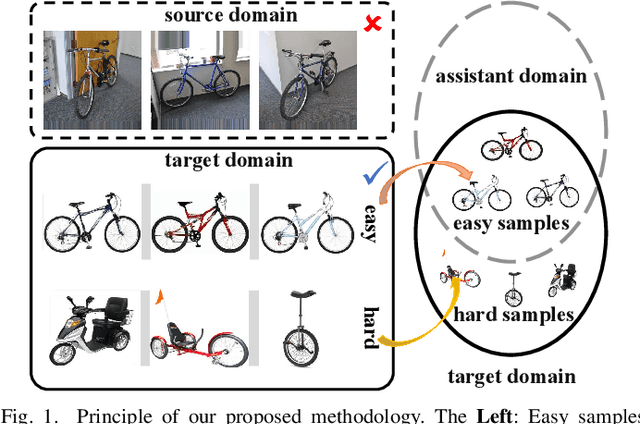
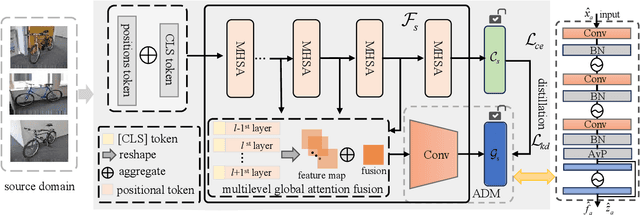
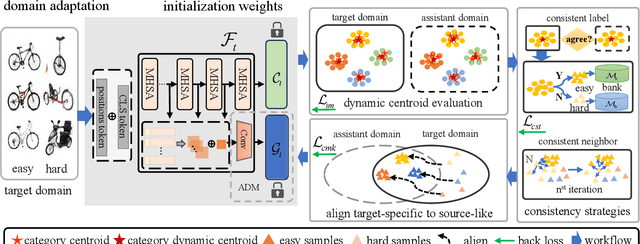

Abstract:Source-free domain adaptation (SFDA) aims to address the challenge of adapting to a target domain without accessing the source domain directly. However, due to the inaccessibility of source domain data, deterministic invariable features cannot be obtained. Current mainstream methods primarily focus on evaluating invariant features in the target domain that closely resemble those in the source domain, subsequently aligning the target domain with the source domain. However, these methods are susceptible to hard samples and influenced by domain bias. In this paper, we propose a Consistent Assistant Domains Transformer for SFDA, abbreviated as CADTrans, which solves the issue by constructing invariable feature representations of domain consistency. Concretely, we develop an assistant domain module for CADTrans to obtain diversified representations from the intermediate aggregated global attentions, which addresses the limitation of existing methods in adequately representing diversity. Based on assistant and target domains, invariable feature representations are obtained by multiple consistent strategies, which can be used to distinguish easy and hard samples. Finally, to align the hard samples to the corresponding easy samples, we construct a conditional multi-kernel max mean discrepancy (CMK-MMD) strategy to distinguish between samples of the same category and those of different categories. Extensive experiments are conducted on various benchmarks such as Office-31, Office-Home, VISDA-C, and DomainNet-126, proving the significant performance improvements achieved by our proposed approaches. Code is available at https://github.com/RoryShao/CADTrans.git.
DFDG: Data-Free Dual-Generator Adversarial Distillation for One-Shot Federated Learning
Sep 12, 2024



Abstract:Federated Learning (FL) is a distributed machine learning scheme in which clients jointly participate in the collaborative training of a global model by sharing model information rather than their private datasets. In light of concerns associated with communication and privacy, one-shot FL with a single communication round has emerged as a de facto promising solution. However, existing one-shot FL methods either require public datasets, focus on model homogeneous settings, or distill limited knowledge from local models, making it difficult or even impractical to train a robust global model. To address these limitations, we propose a new data-free dual-generator adversarial distillation method (namely DFDG) for one-shot FL, which can explore a broader local models' training space via training dual generators. DFDG is executed in an adversarial manner and comprises two parts: dual-generator training and dual-model distillation. In dual-generator training, we delve into each generator concerning fidelity, transferability and diversity to ensure its utility, and additionally tailor the cross-divergence loss to lessen the overlap of dual generators' output spaces. In dual-model distillation, the trained dual generators work together to provide the training data for updates of the global model. At last, our extensive experiments on various image classification tasks show that DFDG achieves significant performance gains in accuracy compared to SOTA baselines.
Data-free Knowledge Distillation for Fine-grained Visual Categorization
Apr 18, 2024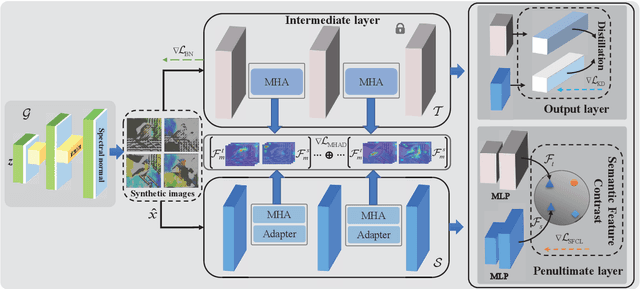
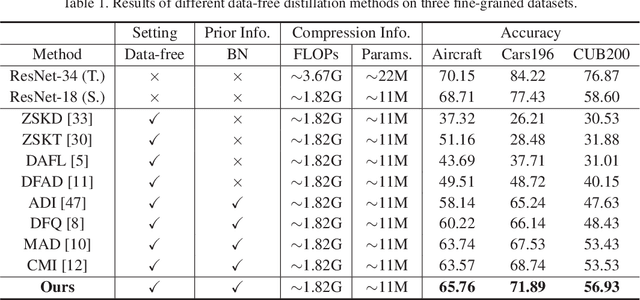
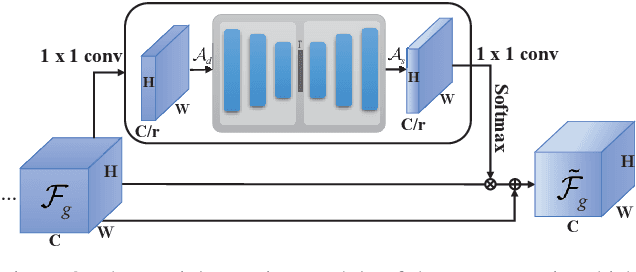

Abstract:Data-free knowledge distillation (DFKD) is a promising approach for addressing issues related to model compression, security privacy, and transmission restrictions. Although the existing methods exploiting DFKD have achieved inspiring achievements in coarse-grained classification, in practical applications involving fine-grained classification tasks that require more detailed distinctions between similar categories, sub-optimal results are obtained. To address this issue, we propose an approach called DFKD-FGVC that extends DFKD to fine-grained visual categorization~(FGVC) tasks. Our approach utilizes an adversarial distillation framework with attention generator, mixed high-order attention distillation, and semantic feature contrast learning. Specifically, we introduce a spatial-wise attention mechanism to the generator to synthesize fine-grained images with more details of discriminative parts. We also utilize the mixed high-order attention mechanism to capture complex interactions among parts and the subtle differences among discriminative features of the fine-grained categories, paying attention to both local features and semantic context relationships. Moreover, we leverage the teacher and student models of the distillation framework to contrast high-level semantic feature maps in the hyperspace, comparing variances of different categories. We evaluate our approach on three widely-used FGVC benchmarks (Aircraft, Cars196, and CUB200) and demonstrate its superior performance.
 Add to Chrome
Add to Chrome Add to Firefox
Add to Firefox Add to Edge
Add to Edge